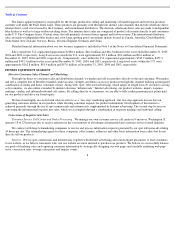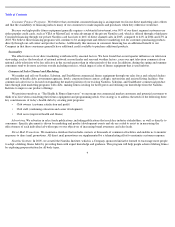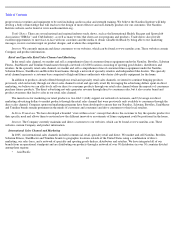Nautilus 2005 Annual Report Download - page 19
Download and view the complete annual report
Please find page 19 of the 2005 Nautilus annual report below. You can navigate through the pages in the report by either clicking on the pages listed below, or by using the keyword search tool below to find specific information within the annual report.
Table of Contents
A decline in consumer spending due to unfavorable economic conditions could hinder our product revenues and earnings.
The success of each of our products depends substantially on the amount of discretionary funds available to consumers and their
purchasing preferences. Economic and political uncertainties could adversely impact the U.S. and international economic environment. A
decline in general economic conditions could further depress consumer spending, especially discretionary spending for premium priced
products like ours. These poor economic conditions could in turn lead to substantial decreases in our net sales.
A decline in our ability to effectively develop, market and sell future products could adversely affect our ability to generate future
revenues and earnings.
Our future success depends on our ability to develop or acquire the rights to, and then effectively produce, market, and sell new products
that create and respond to new and evolving consumer demands. Accordingly, our net sales and profitability may be harmed if we are unable to
develop, or acquire the rights to, new and different products that satisfy our marketing criteria. In addition, any new products that we market
may not generate sufficient net sales or profits to recoup their development or acquisition costs.
During the fourth quarter of 2005, we were slow to ramp up manufacturing volumes on new product innovations. We moved into the
fourth quarter with six complex new cardio products in the product ramp up stage in two of our domestic manufacturing facilities. We
experienced some productivity issues in those products, including problems with component parts from our suppliers. As a result, not all of the
products were in full production in time for us to realize the full benefits of these products in the quarter. This had a significant adverse impact
on our fourth quarter revenues and earnings. If we were to continue to experience similar challenges in bringing new or existing products to
market, we may again experience lower than expected financial results, as well as negatively impact our relationships with important
customers.
We also may not be able to successfully acquire intellectual property rights or potentially prevent others from claiming that we have
violated their proprietary rights when we launch new products. We could incur substantial costs in defending against such claims, even if they
are without basis, and we could become subject to judgments requiring us to pay substantial damages.
A delay in getting foreign sourced products through customs in a timely manner could result in cancelled orders and unanticipated
inventory accumulation.
Many of our imported products are subject to duties, tariffs or quotas that affect the cost and quantity of various types of goods imported
into the United States or into our other sales markets. The countries in which our products are produced or sold may adjust or impose new
quotas, duties, tariffs or other restrictions, any of which could have a material adverse effect on us.
Our business depends on our ability to source and distribute products in a timely manner. As a result, we rely on the free flow of goods
through open and operational ports worldwide. Labor disputes at various ports create significant risks for our business, particularly if these
disputes result in work slowdowns, lockouts, strikes, or other disruptions during our peak importing seasons, and could have a material adverse
effect on our business, potentially resulting in cancelled orders by customers, unanticipated inventory accumulation, and reduced revenues and
earnings.
Any failure by us to manage acquisitions and other significant transactions successfully could harm our financial results, business and
prospects.
As we have done in the past, we may seek to acquire other businesses in the future. Integrating acquired businesses into our operations
poses significant challenges, particularly with respect to corporate cultures and management teams. Failure to successfully effect the integration
could adversely impact the revenue, earnings and business synergies we expect from the acquisitions. In addition, the process of integrating
acquired businesses may be disruptive to our operations and may cause an interruption of, or a loss of momentum in, our core business.
18
























